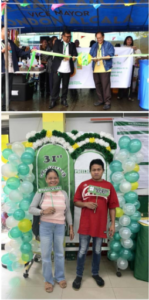
CALAMBA CITY (PIA) – Residents and leaders continue to embrace the government’s campaign towards sustainable communities with the rise of community gardens and recycling facilities
Gilberto Tumamac, chief of Department of the Interior and Local Government (DILG) IV-A’s Local Government Monitoring and Evaluation Division (LGMED), said that the Kalinga at Inisyatiba sa Malinis na Bayan (KALINISAN) and the Halina’t Magtanim ng Prutas at Gulay (HAPAG) greatly benefited barangays by providing better access to cheaper and organic fruits and vegetables.
“The HAPAG has opened up opportunities for bayanihan in the barangays and has provided a great mechanism to provide access to free and cheaper vegetables and healthy meals, ” he added in an interview with the Philippine Information Agency CALABARZON.
Tumamac noted that more than 95 percent of the region’s 3,993 barangays established their own community gardens on idle lands, allowing residents to freely plant and harvest fresh produce.
“Others have expressed concerns about the ownership of idle lands in their barangays. On that part, LGUs must step up.”
In addition to promoting livable communities, the KALINISAN program also supports local government-led initiatives for solid waste management and road clearing.
According to the DILG, several local government have successfully implemented their own sustainability programs, such as Biñan City, Laguna’s ecobricks project and Teresa, Rizal’s Integrated Solid Waste Management Facility.
“It’s important that our kababayans support these initiatives. Because if we are not doing our part in cleanliness and the community, [like] removing obstructions in our public roads, the risks [of accidents] will definitely be higher.”
Launched in 2024, the KALINISAN sa Bagong Pilipinas program pushes for cleaner, safer, and healthier communities.
The HAPAG program aims to improve food security by promoting community-based agriculture. It pushes for the creation of barangay community gardening, where households and communities are encouraged to produce fresh, healthy, and affordable fruits and vegetables from their backyards and other open spaces.
Meanwhile, the Accountable Green Barangay Governance initiative empowers barangays in environmental management, through the Barangay Ecological Solid Waste Management Committees (BESWMC) and the Sangguniang Kabataan (SK) committee. The DILG has launched a social media campaign to gather support from the barangays for the program and participation from the community. (PB/PIA4A)



